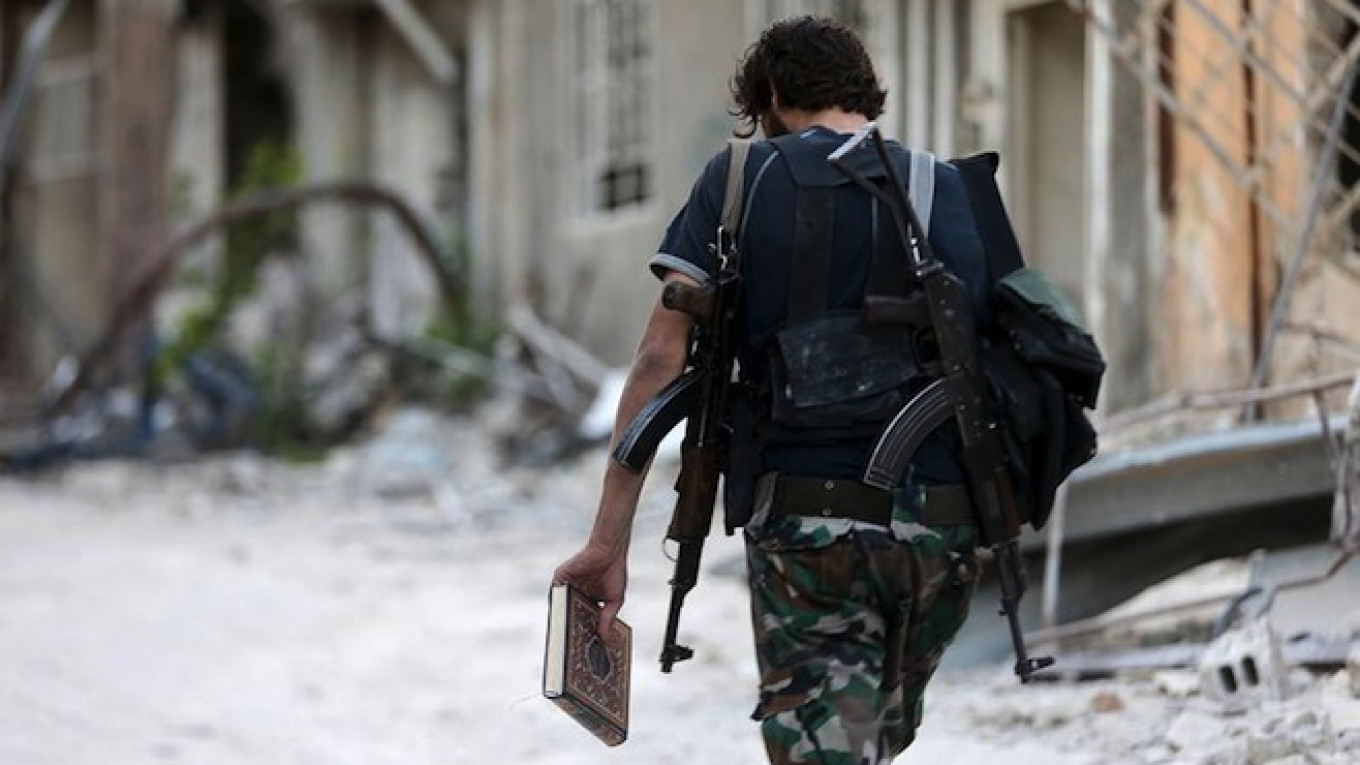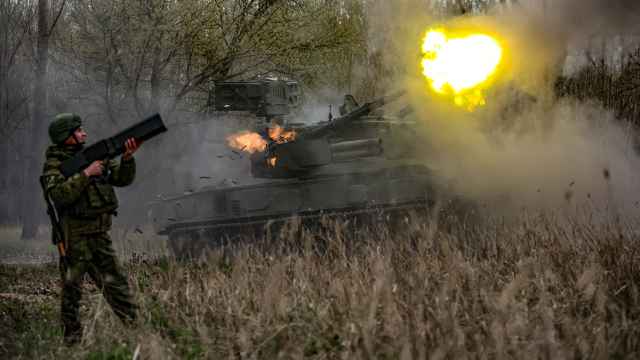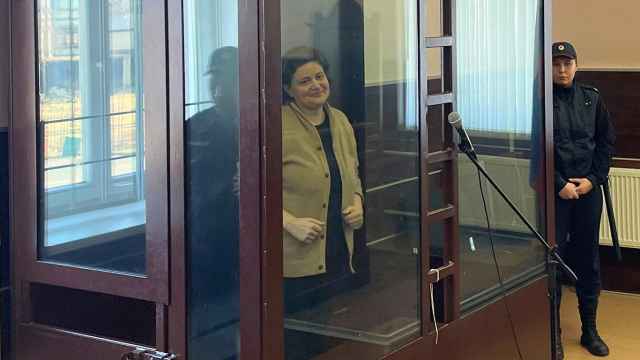The Russian Foreign Ministry on Monday said it had hosted several delegations from the Western-backed Free Syrian Army, but representatives of the opposition alliance said the visit never happened, accusing the Kremlin of waging an information war.
“Nothing of this sort happened on our part as FSA [Free Syrian Army]. It is impossible for us to accept going to Moscow, and to have dialogue with it. We don’t want their help,” Abu Ghiath al-Shami, the spokesman for Alwiyat Seif al-Sham — a faction of the Free Syrian Army fighting in southern Syria — was cited as saying by Reuters.
“We contacted our friends in other areas and nobody went,” he added, according to the report.
Four factions of the loose alliance of moderate opposition groups that fall under the Free Syrian Army umbrella group denied the visit took place, Reuters said.
The Turkey-based political opposition group, National Coalition of Syrian Revolution and Opposition Forces, said in an online statement that no delegation of the Free Syrian Army had visited Moscow. It said the claims were “part of the Russian misleading propaganda that aims at diverting attention from failures of the Russian aggression on the Syrian people.”
Russian media had widely cited Deputy Foreign Minister Mikhail Bogdanov as saying that representatives of the Western-backed Syrian group “are here all the time.”
“There are different people, some are arriving and some are leaving, but everybody says they are representatives of the Free Syrian Army,” Bogdanov was quoted as saying.
In a television interview aired this weekend, Russia's Foreign Minister Sergei Lavrov said Moscow was willing to provide air support for Free Syrian Army forces. Russia has been conducting air strikes in Syria since Sept. 30 — bombings that Western governments have said were intended to bolster the regime of Assad, Moscow's longtime ally, by targeting his opponents.
“We don't want to consider specifically the interests of only Bashar Assad, not specifically the interests of one opposition group. We want to consider the interests of Syria,” Lavrov told state television's “Vesti on Saturday” program.
“And for Syria, it is important that there is a peaceful environment, that the war ends as soon as possible, and that terrorists don't get a chance to seize power in Damascus or in any other part of Syria,” Lavrov said, according to a transcript published on his ministry's website.
In order to support rebel groups, including the Free Syrian Army, Moscow needed to know where they were, and to “establish contact” with opposition forces that combat terrorism, Lavrov said, accusing Western governments of refusing to share information with Russia about the locations of “patriotic opposition” forces.
Putin claimed to have recently secured Assad's acquiescence regarding Moscow's possible support for Syrian opposition groups combatting terrorists.
During a recent meeting with Putin in Moscow, Assad said he would respond “positively” to such a move, the Russian leader told the Valdai Club of international policy-makers in Sochi last week, according to a transcript published by the Kremlin press office.
“We are now thinking about this and are trying, if that can be done, to move those agreements into a practical sphere,” Putin said.
The Kremlin press office reported Monday evening that Putin had spoken by telephone with Saudi Arabia's King Salman, whose government backs opponents of Assad. The call was initiated by the Saudi king, the Kremlin said, without providing any details of the conversation.
Meanwhile, Russia's foreign minister spoke by telephone with U.S. Secretary of State John Kerry, at Washington's request, to discuss “projects of a political settlement in Syria with the participation of the authorities and the patriotic opposition,” the ministry said in a statement Sunday.
In recent remarks, Kerry acknowledged that the U.S. and Russia agree on larger goals regarding Syria — they seek a unified Syria rather than a dangerously fractured nation, the elimination of extremists and for Syrians to choose their future leadership.
“It is clear that Russia and Iran are supportive of Assad, and certainly publicly have argued that it is important for Assad to be there for the stability of the country,” Kerry said Friday in Vienna. “A whole bunch of countries, including the United States, Saudi Arabia, the Emirates, Turkey, Qatar, Jordan, Egypt, Great Britain, Germany, France, Italy, most of Europe, dozens of countries if not hundreds, understand that Assad creates an impossible dynamic for peace. … But if we can get into a political process, sometimes these things have a way of resolving themselves.”
The Free Syrian Army has been seeking “dialogue” with Moscow and urging Russia to cease air strikes against areas controlled by the group, its co-founder Fahad Masri was quoted Sunday as saying by Russia's state-run RIA Novosti news agency.
The Free Syrian Army has requested a meeting in Cairo, Egypt, but while Russian officials have indicated a willingness to talk, no date has been set, Masri was quoted as saying.
“We are hoping that Russia will stop bombing an array of our provinces, particularly the province of Homs, because there are many units of the Free Syrian Army there,” he said, RIA Novosti reported Sunday.
Contact the authors at newsreporter@imedia.ru and e.hartog@imedia.ru
A Message from The Moscow Times:
Dear readers,
We are facing unprecedented challenges. Russia's Prosecutor General's Office has designated The Moscow Times as an "undesirable" organization, criminalizing our work and putting our staff at risk of prosecution. This follows our earlier unjust labeling as a "foreign agent."
These actions are direct attempts to silence independent journalism in Russia. The authorities claim our work "discredits the decisions of the Russian leadership." We see things differently: we strive to provide accurate, unbiased reporting on Russia.
We, the journalists of The Moscow Times, refuse to be silenced. But to continue our work, we need your help.
Your support, no matter how small, makes a world of difference. If you can, please support us monthly starting from just $2. It's quick to set up, and every contribution makes a significant impact.
By supporting The Moscow Times, you're defending open, independent journalism in the face of repression. Thank you for standing with us.
Remind me later.






